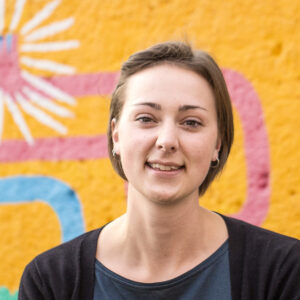
Ally Siebert says Outtatown helped her lay strong foundations in key human skills, placing her ahead of the curve now that she's training for medicine.
What does it take to be a professional healer? Medical student Ally Siebert, a graduate of CMU's Outtatown program, is entering clerkship at University of Waterloo. The Ottawa native says that while much depends on your specialization, human skills can make or break your efficacy as a care provider.
"I don't think most people understand what it really takes to be in this profession. It's not all about the science. For some people it will be—nephrologists, you know, that's chemistry—but family medicine? When is a patient ever going to want to know the mathematical formula that tells them their kidneys aren't working? They want to know how long they're going to live. It's a very different skill set to answer those two questions," Siebert says.
Participating in CMU's Outtatown program helped Siebert expand her mind and horizons early, she says. By exposing her to a wider variety of contexts, people, and experiences than she would otherwise have encountered, Outtatown prompted her to lay strong foundations in human skills she now relies on every day: sensitivity to narrative, self-awareness, capacity for rigorous ethical analysis (both short- and long-term), versatile or resourceful communication, empathy, humility, and open-mindedness.
Siebert, who completed an undergraduate degree in English literature at Conrad Grebel University College following Outtatown, says good listening in a medical context includes all of these elements, but is especially bound up in sensitivity to narrative, or story:
"People are stories! Stories have climaxes and low points and character development. When somebody's telling you about their symptoms, you listen for that plot and character development, the order in which they tell things, what details they hold back or push forward—all those things that help you bring together a fuller picture of illness or wellness. It's about finding the big picture that gives meaning to the central goal."
"In exams, what I have to do as a student is take the information I get from a patient, organize it for myself and discern its significance, then translated it and deliver it to my supervisor in the most meaningful and effective way possible. There are specific rules and criteria governing that step. Then, I go back into the examination room and I have the same conversation (diagnosis) with the patient, but it has to be delivered completely differently, which means translating again. I have to jump between those genres of communication in order to make information mean, in the most useful way, to different audiences—and I can do it."
Siebert has just begun her clerkship, one of the last stages of a medical degree entailing hands-on practise with supervision. She will graduate just ahead of her Outtatown class's 10-year anniversary. Plans for a reunion, right here in Winnipeg, are already underway.
This story was originally posted on June 24, 2020 at https://media.cmu.ca/alumni-allysiebert.
